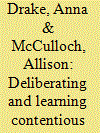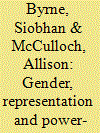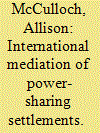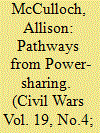| Srl | Item |
| 1 |
ID:
127020


|
|
|
|
|
| Publication |
2013.
|
| Summary/Abstract |
History education can either exacerbate polarization and division or it can have conciliatory potential. Looking at a number of divided societies, we identify trends in curriculum portrayals of inter-group conflict. Noting the power of re-telling the past, we argue for a conciliatory approach to textbook design that entails the inclusion of multiple narratives. We detail why groups need to set out their own account of events and discuss the importance of the way that groups develop their accounts. We recommend an institutional, process-based approach to textbook design grounded in the values of deliberative consociationalism and argue that the conciliatory approach is best pursued in a two-stage model of deliberations. We develop this model and focus on how deliberations might occur and with what restrictions, taking seriously concerns about the applicability of deliberation in divided societies.
|
|
|
|
|
|
|
|
|
|
|
|
|
|
|
|
| 2 |
ID:
116353


|
|
|
|
|
| Publication |
2012.
|
| Summary/Abstract |
An emerging tension characterizes conflict resolution practice: promoting power-sharing between ethnic groups while simultaneously mandating women's inclusion in peace processes and in post-conflict institutions. Scholars of ethnic conflict have not adequately theorized the gender implications of power-sharing, and practitioners have failed to implement mechanisms that would make power-sharing representative of constituencies beyond ethno-national cleavages. There is no substantive reason why the representation of women and ethnic groups should be in tension. Nevertheless, gender is often ignored in the power-sharing literature and gender-mainstreaming practices appear irreconcilable with power-sharing practice. Drawing on three cases of post-conflict power-sharing - Bosnia and Herzegovina, Burundi, and Northern Ireland - this article identifies reasons why this tension remains in practice, especially the overriding emphasis in power-sharing on ethno-nationalist elites and conflict protagonists.
|
|
|
|
|
|
|
|
|
|
|
|
|
|
|
|
| 3 |
ID:
162434


|
|
|
|
|
| Summary/Abstract |
Power sharing is largely accepted among scholars and policy-makers as a potentially effective mechanism for building peace in the aftermath of violent ethnic conflicts and self-determination disputes. Although the operation of power sharing may be prone to ongoing challenges and even political crises arising from the legacy of the conflict, international actors continue to promote power-sharing arrangements to manage self-determination and other ethnopolitical conflicts. This article investigates the normative and instrumental reasons why third-party mediators (on behalf of international organizations and/or states) turn to power-sharing strategies during peace negotiations. It considers the reasons why third-party mediators promote power sharing when its maintenance is likely to depend on their ongoing commitment and governance involvement. We argue that mediators draw from four different perspectives in their support of power-sharing settlements: international law, regional and internal security, democracy and minority rights, and a technical approach where mediators focus on the mechanics of power-sharing designs. The article draws on in-depth semi-structured interviews with officials from the United Nations and the European Union working for the organizations’ respective mediation units as well as documentary analysis of official mediation documents.
|
|
|
|
|
|
|
|
|
|
|
|
|
|
|
|
| 4 |
ID:
158924


|
|
|
|
|
| Summary/Abstract |
This article focuses on power-sharing’s ‘exit dilemma’. While power-sharing may be a necessary transitional device to manage deep divisions, it also allegedly obstructs the long-term goals of peacebuilding and democratisation in divided societies. Three countervailing perspectives are considered here: (1) power-sharing is a transitional device unable to transition to more ‘normal’ political arrangements, creating instability; (2) power-sharing is a transitional device that can be designed for stability and adaptability; and (3) power-sharing is a lasting institutional fixture that facilitates peace and democratisation. The article presents a typology of pathways from power-sharing, arguing that the exit dilemma is real but not insurmountable.
|
|
|
|
|
|
|
|
|
|
|
|
|
|
|
|